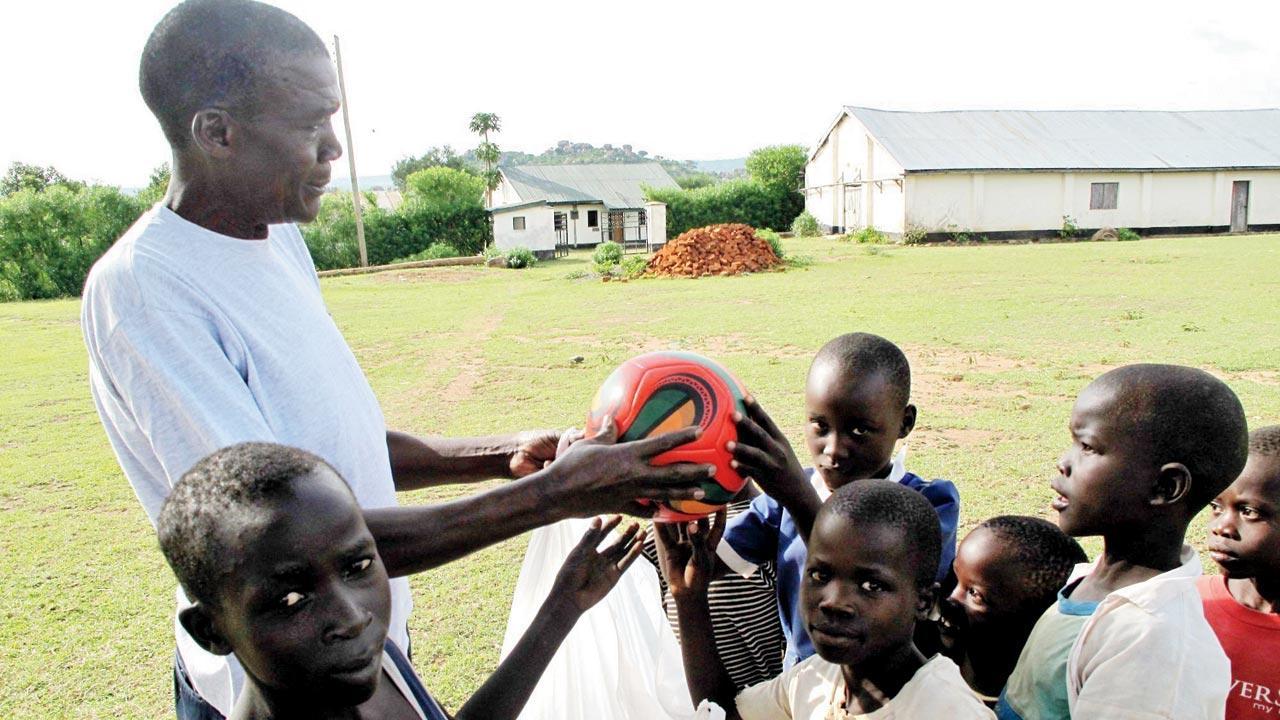Sometimes greatest unintended harm comes out of acts of well-meant kindness. I learned this lesson in a small African village in 2010

The village chief had given away the football to the children. Pic/C Y Gopinath

ADVERTISEMENT
Gifts have been on my mind all week. Today my son, two oceans and two continents away in Canada, turns 24. Being a practical sort, he’s not a fan of surprises so I have learned to tell him my budget and ask him what gift he’d like.
This year, in an unexpected sign of spiritual emergence, his wish was that I pour myself a glass of my favourite wine and watch the movie Soul. I was deeply touched by his gesture — but also reflective.
Here’s my question to you: are there any times when a gift, however well-meant, could be a bad thing? Even harmful?
You see a rag-tag bunch of urchins playing alley cricket using bricks and sticks as stumps — and the charitable thought crosses your mind that you could easily buy them a cricket kit. What harm could that possibly do?
Your aunt dies, leaving you a fortune. Why not buy a computer for every child in your village? What harm could that do?
I discovered for myself the unintended harm the best intentions could cause while living in a small tribal village in Kenya, not far from Lake Victoria. The year was 2010, the month was November.
My interest was in experiencing the lives of people so impoverished that they had to make do without electricity or water. After some research, I found the Kenyan village of Kajulu, so small that it does not even show on a Google map. An old lady let me live in her mud hut and share whatever simple fish meals she was served with catch from the lake.
An ragamuffin called Helen, permanent smile revealing a mouth full of permanent buck teeth, was her daily help, starting the fire, making tea, breakfast and lunch for her and doing her laundry as well. For water, they managed thriftily through winter with rainwater that had dripped off the roof into giant storage drums. Helen was kind, serving me hot tea several times, warming up some water so I could sponge myself and washing my clothes.
To keep busy, I offered to work for Kajulu’s church and was asked to teach a dozen or so teenage mothers, bright women whose lives had ended abruptly when they had been found to be pregnant. Abortion was not an option so schooling had ended without warning virtually overnight, and they had been banished to the cornfields behind the house.
We’d meet every afternoon in a room behind the church and I’d be charmed both by their fat, gurgling babies and their endless thirst for knowledge about the world around them and inside them, and the futures they could hope for.
My daily journey took me over a meadow where children played football. Their ball intrigued me — a rainbow-coloured sphere. It turned out to be a tightly wadded collection of pink, blue, green and yellow plastic shopping bags.
This was when the gift idea came to me. I was taking a two-day break in Nairobi and thought I could bring a proper football back for the children. While at it, I thought I’d also pick up a nice dress for sweet, buck-toothed Helen and some books for the girls.
I could not have imagined how much damage my gifts would do.
The village chief kindly agreed to give away the football to the children while I clicked pictures. The girls, who had apparently watched the ceremony through the meeting room window, were oddly silent that day even after receiving the many books I’d bought for them.
Finally, one pouted, “We play football too.”
“But you wanted books,” I protested.
“Yes, but now you’ve spoilt everything for those children,” she said.
I was confounded. “Spoilt?”
“Yes,” said another. “Because who will take the football home after the game?”
The biggest, strongest, pushiest boy would lay claim to the football, declaring himself the custodian. With it, he would get the power to decide when they could play and more importantly, who could play. Anyone who rubbed him the wrong way would be out of the game.
My innocent gift had politicised their game, setting child against child in a group where everyone had been equal before.
It was worse with poor Helen, whose gift was a lovely white skirt with flowers. She began hanging around outside my hut to the point of my embarrassment, asking if there was anything else I needed. The pastor finally explained to me.“You’re probably the first man who has shown her such kindness. She is beholden to you and hoping you will let her repay you — by offering you the one thing a woman can offer a man.”
I left Kajulu after a month, humbled and chastened. In the plane back, I made up a word I thought the language needs — maltruism. I define it as: “Great unintended harm done by someone setting out to do great good.”
Here, viewed from there. C Y Gopinath, in Bangkok, throws unique light and shadows on Mumbai, the city that raised him. You can reach him at cygopi@gmail.com
Send your feedback to mailbag@mid-day.com
The views expressed in this column are the individual’s and don’t represent those of the paper
 Subscribe today by clicking the link and stay updated with the latest news!" Click here!
Subscribe today by clicking the link and stay updated with the latest news!" Click here!






